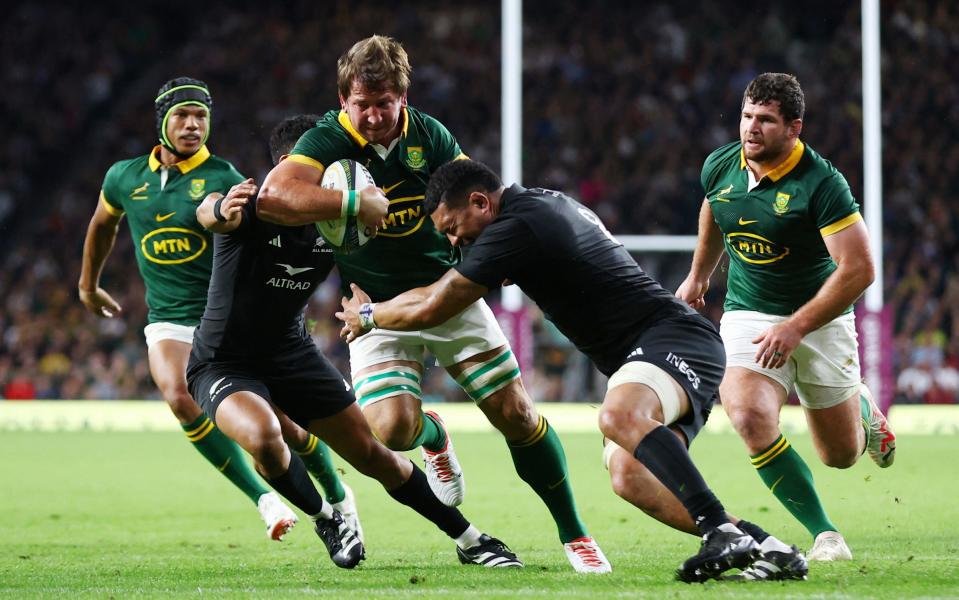
For a sport which has gone through significant structural modifications in the past 20 years, making it unrecognisable compared to the World Cup in New Zealand just 12 years ago, rugby union does not always handle change very well. Evidence of this could be found in some of the pearl-clutching reactions to South Africa’s 7:1 bench split against New Zealand.
Picking seven forwards and one back, it should be stressed, was not Jacques Nienaber’s original plan. A knock to Willie le Roux’s ribs in training led to his withdrawal from the bench and Kwagga Smith being drafted in at the last minute, wearing number 24 on his back.
Smith has vast experience in sevens with the Blitzbokke, winning Commonwealth gold and Olympic bronze, and is going to be better at adapting to a role in the backline than most forwards. Still, his set position in the back row meant that South Africa had seven forwards and one back, Cobus Reinach, on their bench. All seven forwards came on in the pack – with Pieter-Steph du Toit the only surviving starter, although he did get a bit of a break when spending 10 minutes in the sin-bin, while Reinach ended up replacing Makazole Mapimpi on the wing.
Here was something interesting. Whisper it, perhaps even fun. Would the deep-rooted pathos of the – checks notes – Qatar Airways Cup survive such a dramatic upheaval to rugby union’s structures?
Perhaps there would not have been such a fuss if New Zealand’s pack had actually displayed some of the improvements which have been apparent since Jason Ryan took over as forwards coach following the series loss to Ireland last year. Then again, losing your first-choice tighthead in Tyrel Lomax and having Scott Barrett sent off for two yellow cards before half-time is going to leave your already-weaker pack highly exposed against arguably the best forward unit in the game. New Zealand’s 35-23 win at Ellis Park last year stemmed from a performance of the highest quality from their forwards. At Twickenham with no Lomax, Barrett or Shannon Frizell, they meekly folded as South Africa’s expanded bomb squad feasted on them.

Does this mean South Africa are ripping up plans for the Rugby World Cup and planning to use 15 forwards per Test? Of course not. Just because it was effective one time there seems to have been a loss of perspective about the risks attached with only including one specialist back on your bench. Having forwards swaps roles with backs might briefly work from a physical standpoint, but it can wreck attacking and defensive systems. Bringing on a flanker to play at inside centre or on the wing is fine in a friendly but potentially disastrous in a Rugby World Cup knockout game.
Barring another late injury withdrawal it will probably never happen again. So why not just enjoy it?
Matt Williams, the former Scotland head coach and now a pundit in Ireland, wailed that South Africa “are just abusing the bench at the moment”, citing the bench’s original purpose for “safety reasons, so that people didn’t come on in positions they weren’t trained for, so we didn’t have injuries”.
Certainly there is a debate to be had about the number of replacements that should be permitted beyond the front-row specialists, with Eddie Jones frequently banging the drum for the bench contingent to be reduced in order for players on the field to become increasingly fatigued, therefore opening up more space for attacking rugby.
But to use South Africa’s 7:1 split as a vessel to push that narrative all feels rather false, while any negative reaction to it has been over the top. A headline on AllBlacks.com, the team’s official website, read “controversy over South Africa’s 7:1 bench split”. Is there really any? A quick search on social media yields only comments from people about the outrage towards the 7:1 split, without much evidence of the outrage itself (Williams aside).
If anything we should all be daring Nienaber and Rassie Erasmus to go for a whole bench of eight forwards and to see what happens. Replace the whole pack and see what bedlam you can create, good or bad. You would not then have a bench “split”, just a juggernaut on ice ready to cause chaos. And some very tired backs, which plays into your favourite team’s advantage.
This is a sport currently plagued by serious issues with financial catastrophes seeing clubs fold and the risk of major brain injuries currently being attacked in the strongest way possible with a revamped lawbook and strict refereeing in order to protect players. But a 7:1 bench split is not a serious issue. We should enjoy the game’s quirks more when they happen.
Article courtesy of
Source link